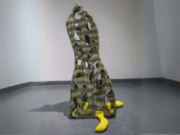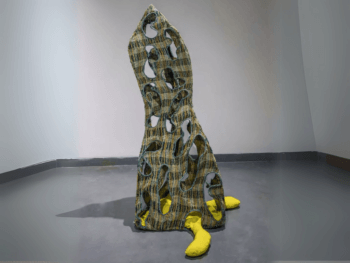
Ayad Akhtar tells us what inspired his career-launching play Disgraced and why it's the most-produced stage show of the 2015-2016 season.
Embarking on a career as an artist is a dicey proposition, fraught with rejection, self-doubt and financial infirmity. But if you’re able to weather the tough times and hang tight until your big break presents itself, the reward is the indelible satisfaction of knowing that you not only chased your dream, but caught it.
It’s fair to say that, for the past few years, Ayad Akhtar has been enjoying that feeling. But before that, he was in the same boat as a lot of entertainers. After studying theatre at Brown University, the 45-year-old Pakistani-American playwright spent most of his 20s and 30s grinding away in the fickle trenches of the entertainment business.
“I had a high school teacher who made me want to become a writer when I was 15,” Akhtar explains, taking a breather from the mountain of writing gigs he’s currently enjoying to chat with ANOKHI. “I’ve often said that I’d fallen in love so deeply with her vision of literature and storytelling when I was 15 that I never fell out of love. And that I think it’s that intensity of love that has kept me going through everything. That commitment is the only thing that could’ve got me through some very, very difficult times.
“I began to despair that there wouldn’t be anything like consistent solvency by the time I hit my mid-30s. But it is what it is. You just stake it all on yourself in some way and you suffer the consequences; and there’s a universe in which this phone call doesn’t happen because I can’t get anybody to pay any attention to anything that I’m doing.”

Photo Credit: Nina Subin

Photo Credit: nytimes.com
The following year, his play took home the Pulitzer Prize for Drama; in 2014, it made the jump to Broadway, with a cast including Hari Dhillon, How I Met Your Mother’s Josh Radnor and Boardwalk Empire’s Gretchen Mol; and this season, it’s set to be the most frequently produced play across the continent — including an upcoming engagement at Mirvish Productions’ Panasonic Theatre in Toronto from April 3 to 17.

In 2014, Disgraced went to Broadway with Gretchen Mol, Karent Pittman, Hari Dhillon and Josh Radnor.
Photo Credit: variety.com
As for why Disgraced is now the go-to production for theatre directors across North America, the timely subject matter and intense, often divisive reponse the play evokes in audiences surely plays a part. But Akhtar humbly admits that there are other reasons for its ubiquity.
"I mean, I’m obviously flattered to whatever extent that’s appropriate, by the fact that it’s so produced, but I’m not sure what the large meaning of it all is . . . I think I’m pleased that people find meaning in it. I think there are obviously some practical reasons why the play is a popular choice among artistic directors—it’s a multicultural cast, it’s a small cast, it’s a single setting. It allows artistic directors to check off a lot of boxes in terms of diversity and whatnot. And beyond that, it seems like the play itself engages audiences in ways that seem to be very satisfying; although it also appears to release a kind of trouble and dissension amongst the viewers as well. So it’s tough to say."

Ali Momen.
Around the same time his stage career was taking off, Akhtar also published his first novel, American Dervish — the 1970s-set tale of a Pakistani boy growing up in the American Midwest and struggling to come to grips with religion and identity. Indeed, 2012 was a breakout year on multiple fronts for the Wisconsin-raised writer.
Of course, Akhtar wasn’t exactly an unknown before this theatical and literary boom. In 2005, he co-wrote and starred in The War Within, an acclaimed indie flick about a Muslim-American whose false imprisonment by U.S. authorities turns him into an extremist. And in 2011, he portrayed real-life U.S. Treasury official Neel Kashkari in the HBO original film Too Big to Fail about the government's efforts to untangle the 2008 financial crisis, sharing the screen with the A-list likes of William Hurt and Paul Giamatti.

Photo Credti: Hachette Book Group
These two roles are basically the extent of Akhtar’s on-screen résumé; and though he remains open to more acting opportunities in the future, there’s one unfortunate reality of the entertainment biz that’s kept him from pursuing the craft.
“I think it was never a serious ambition because I never imagined having a career that could rival any of the people that I admired greatly,” he explains, “because of my ethnicity. It didn’t strike me that there was any chance that I would have that kind of a career . . . You can’t become a great actor unless you have great opportunities. I just didn’t see anybody who had them. And I frankly still don’t. I think that this new generation, there are writers like myself that are writing roles which young people of talent can cut their teeth on and expand their capacities, their craft. You have to have those roles in order to grow as an artisan; when I was coming up, they just weren’t [there].”

Photo Credit: Magnolia Pictures
Besides which, he has plenty of writing projects to keep him busy. In fact, Akhtar squeezed in this interview while taking a break from rewriting the second act of his 2014 play The Invisible Hand, which is set for a revival in London. He’s also working on his second novel, as well as a film adaptation of Disgraced and an HBO pilot, among other things.
The natural impulse is to crave this kind of success at an early age, but a convincing argument could be made that it was his decades-long struggle that forged the authorial voice that audiences and readers are responding to.
“The sheen goes off the dream a little bit when you spend so long chasing it and it amounts to nothing,” he says, reflecting on the professional instability of his 20s and 30s. “And then there was a different orientation . . . there was a different way of approaching [the craft] that seemed to be much more valuable, which was to be interested in others and interested in the world and much less preoccupied by myself and my situation and my pain or my status or my glory or what have you, which was very much what preoccupied me, as it does many young writers for a very long time.”

Photo Credit: HBO
Ironically, the acclaim and adoration often arrive once you’ve lost interest in them. But now that he has them, the 45-year-old's got some advice for those young writers and actors just now embarking on the path he set out on all those years ago.
“Stick with it,” he says. “It’s a hard choice and there’s a lot of dejection and a lot of rejection, and I think you have to put the time in. And sometimes a lot more time than you think before you’re ever going to get to something like a finish line . . . if there is something like that.”
Main Image Photo Credit: Mirvish Productions
Matthew Currie
Author
A long-standing entertainment journalist, Currie is a graduate of the Professional Writing program at Toronto’s York University. He has spent the past number of years working as a freelancer for ANOKHI and for diverse publications such as Sharp, TV Week, CAA’s Westworld and BC Business. Currie ...














































































































